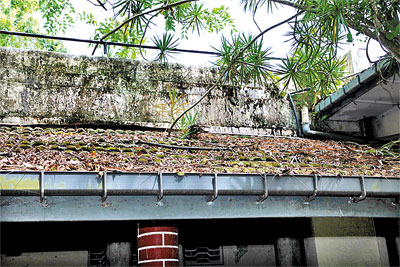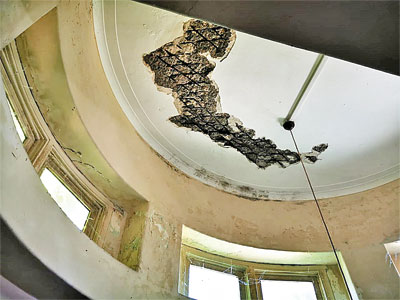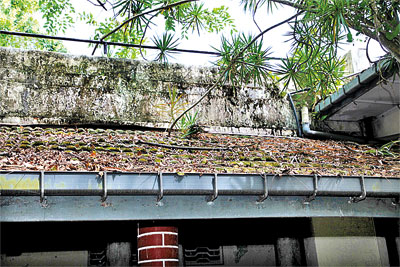News
Talks on the fate of J R Jayewardene’s Ward Place property
Steeped in history, the Ward Place home of late President J R Jayewardene and his wife, Elena, is crumbling. It has been ravaged by time and neglected, but on the orders of Prime Minister Mahinda Rajapaksa, the groundwork is now being laid to turn the edifice into a museum and environmental centre with Government support.
The first discussion on this has been held between Vidura Wickramanayaka, State Minister of National Heritage and Rural Arts, and Jayewardene family members.
President Jayewardene believed the house must not be left to family, as descendants would have difficulty maintaining it, said his grandson, Pradip. He was inspired by the homes of other dignitaries, like D S Senanayake.
 “In many cases, these houses are not looked after, become derelict and fall into disuse after which they are auctioned or sold,” Pradip reflected. “He wanted to preserve the house at Ward Place.”
“In many cases, these houses are not looked after, become derelict and fall into disuse after which they are auctioned or sold,” Pradip reflected. “He wanted to preserve the house at Ward Place.”
The name of the abode is Braemar, after a village in Scotland. “It was the village my grandparents’ father brought their Governess from,” Pradip said. The house belonged to my grandmother, Elena Jayewardene.”
It was in 1981 that President Jayewardene first gifted the property to the Inland Revenue Department using a provision in the relevant law that allowed him to hand over property in lieu of tax. He requested that the house be used by the Institute of Fundamental Studies.
In 1985, he amended the deed of gift to say it should be given to the Archaeology Department. He also called for an exhibit showcasing the donor and the family of the donor, Elena Jayewardene. His idea was to create a museum to hold mementos of him and his family.
But the deed was amended a third time in 1993, bringing the Inland Revenue Department in and adding the final recipient to be the J R Jayewardene Centre. This happened so late because the Centre hadn’t been set up till 1988.
The J R Jayewardene Centre is under the Government and created by an act of Parliament. The clause requiring a family exhibit remained unchanged and is still valid.
 “The Director of Archaeology, the Director of the Institute of Fundamental Studies, and the Inland Revenue Commissioner were all brought in,” Pradip said. “They signed the final deed along with my grandmother to ensure that everything was okay, legally.”
“The Director of Archaeology, the Director of the Institute of Fundamental Studies, and the Inland Revenue Commissioner were all brought in,” Pradip said. “They signed the final deed along with my grandmother to ensure that everything was okay, legally.”
And that’s where it stands. “My grandparents had life interest so this only came into effect when my grandmother passed away in 2007,” he pointed out. “It then became property of the Government through the J R Jayewardene Centre.”
The house is in a bad state: rotten floors, corroded roofs and other iron fittings, and crumbling concrete. But the structure is sturdy and intact. “I, too, saw the house after a long time,” Pradip said. “We don’t know how much it will cost (to renovate). An architect will have to first look at it.”
Pradip thinks the plan would be to preserve the house the way it had been when the ex-President was alive. It is a place of history where many important national decisions were taken. It was also somewhere world leaders dropped in.
“I grew up in that house from the age of 10 or 11,” Pradip remembers. “When I was 11, I remember we were getting ready for a birthday celebration and had ordered food, short-eats and all that. But nobody could come because the JVP insurrection had started a few days prior. So, we had to have the party by ourselves!”
“Then, during the curfew which lasted for about three months, we made friends in the neighborhood and people would jump over the wall and meet at our house for football, cricket, you name it, in the garden,” he said.

The Ward Place residence of Sri Lanka's first Executive President J.R. Jayewardene is in a dilapidated condition. Insets show the roof and the ceiling of a house where many a decision had been taken to change the destiny of this country
When President Jayewardene was about to be arrested for allegedly violating stringent foreign exchange controls, his supporters teemed in from Kelaniya to show solidarity. “We suddenly found the entire garden full of people,” Pradip narrated. “Thousands of people came, and stayed there.”
The property is around one acre in extent, but the house occupies 60 perches. The value is estimated to be around Rs 900mn now although valued at Rs 4mn when the President gifted it. Pradip said the Government will work closely with the Jayewardene family on the project. Minister Wickramanayaka, he observed, understood the historical value of the building and was taking a personal interest in renovating it and setting up a museum.
The issue was first brought up by Samagi Jana Balawegaya MP Tissa Attanayake, Minister Wickramanayaka said. But failure to act earlier had worsened the degradation, making it more expensive to restore. Financial constraints could affect the project’s timing, he warned.
“The person is no more but he left both a tangible and intangible legacy,” he mused. “Mahinda Rajapaksa started the project in 2014 but it was halted after he had to leave office. He has now instructed us to look into the matter again. We have to honour our history and J R Jayewardene is a very significant part of it.”
It is the family’s wish that part of the house be turned into an ecological and environmental awareness centre open to the public. There is still no fund allocation or timeframes as talks have just started but there are some international donors who have expressed interest. Decisions will be made soon, the Minister said.
Photos from Vidura Wickramanayaka’s FB page

